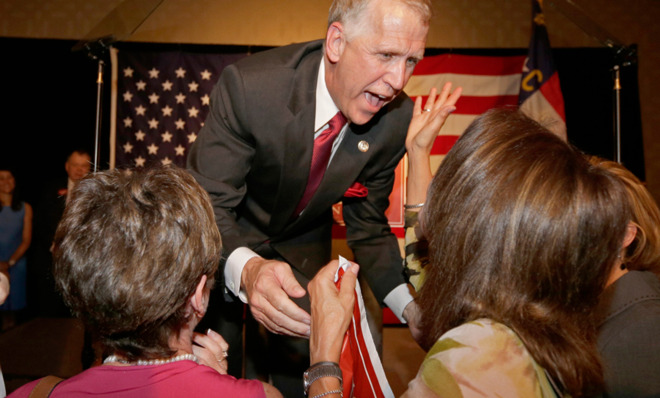Why the GOP wants to 'divide and conquer' the poor
The conservative approach to poverty alleviation is rooted in outdated notions of who does and doesn't deserve aid


A free daily email with the biggest news stories of the day – and the best features from TheWeek.com
You are now subscribed
Your newsletter sign-up was successful
Control of the Senate may very well hinge on the ultra-competitive race in North Carolina. It also happens that the contest between Democratic incumbent Kay Hagan and state House Speaker Thom Tillis presents us with a stark contrast in governing philosophies, particularly on the issue of assisting the poor.
Last week, as Tillis was wrapping up the Republican primary, footage was discovered of remarks he made in 2011 about wanting to "divide and conquer the people who are on assistance." He implored those in the crowd to:
show respect for that woman who has cerebral palsy and had no choice in her condition, that needs help and that we should help. And we need to get those folks to look down at these people who choose to get into a condition that makes them dependent on the government and say, "At some point you're on your own!" [The New Republic]
Some have compared this video to Mitt Romney's infamous "47 percent" blunder in 2012. But where Romney exploited fault lines between the supposed makers and takers, Tillis stoked a different social division: the deserving versus the non-deserving poor.
The Week
Escape your echo chamber. Get the facts behind the news, plus analysis from multiple perspectives.

Sign up for The Week's Free Newsletters
From our morning news briefing to a weekly Good News Newsletter, get the best of The Week delivered directly to your inbox.
From our morning news briefing to a weekly Good News Newsletter, get the best of The Week delivered directly to your inbox.
The distinction has its roots in 17th-century European beliefs about who deserved public assistance. According to law professor Nicole Huberfeld, "[T]he prevailing belief was that the working poor deserved assistance," while the non-working poor did not. Under Elizabethan Poor Laws, public assistance was made available to an ad hoc list of those deemed blameless for their poverty, such as women, children, the blind, the disabled, and the elderly. These traditional categories were then imported to the United States when various levels of government started to provide poverty assistance over a century ago.
We see similar beliefs reflected in Tillis' divide-and-conquer mentality. His idea of a justified welfare recipient — a woman with a disabling medical condition — fits comfortably in traditional notions of the deserving poor. Yet those who are otherwise capable of working must be cut off from the public spigot. Under this view, mere economic insecurity or joblessness is not enough to merit assistance. And it is this view that has come to dominate the economic platform of the modern GOP, as reflected in Rep. Paul Ryan's (Wis.) budget and the policies of Republican-controlled statehouses across the country. As Ryan recently said, "We don't want to turn the safety net into a hammock that lulls able-bodied people to lives of dependency and complacency."
Even in the best of economic circumstances, this would be a dubious premise. But the U.S. economy has been in the doldrums for six years and counting, which means that there are plenty — millions — of workers who are in economic straits through no fault of their own. Tillis essentially assumes that humans are flawed while the market is perfect, when we know that is emphatically not the case.
As a state legislator, Tillis did his share of dividing and conquering the poor. He proudly touts his obstruction of the ObamaCare Medicaid expansion in North Carolina, boasting in a campaign ad that he "stopped [it] cold."
A free daily email with the biggest news stories of the day – and the best features from TheWeek.com
Historically, Medicaid eligibility has been based on certain categories of need much like the Elizabethan categories. ObamaCare tried to move Medicaid coverage away from piecemeal categorical eligibility by funding state expansions to cover all Americans earning less than 138 percent of the federal poverty line.
But North Carolina continues to only offer Medicaid coverage to the traditional categories of the deserving poor. Non-disabled adults in North Carolina are completely ineligible for Medicaid, regardless of how little income they earn. Even adults with dependent children are only eligible if they earn less than 45 percent of the poverty line — about $8,800 per year for a family of three. Had North Carolina expanded Medicaid, 319,000 people would have gained insurance coverage.
North Carolina's refusal to expand Medicaid was made possible by another conservative dividing the deserving from the non-deserving poor. Supreme Court Chief Justice John Roberts relied on this same exact distinction to strike down the mandatory Medicaid expansion in NFIB v. Sebelius.
In a decision joined by six other justices, Roberts artificially divided "old Medicaid" from ObamaCare's "new Medicaid." Old Medicaid, Roberts wrote, covered "four particular categories of the needy: the disabled, the blind, the elderly, and needy families with dependent children." That is, it covered only the traditionally deserving poor. After ObamaCare, he asserted, Medicaid "is no longer a program to care for the neediest among us, but rather an element of a comprehensive national plan to provide universal health insurance coverage."
As a result, he said, Congress could not mandate that states expand their programs or else lose federal funding for "old Medicaid." This decision enabled states like North Carolina to continue keeping Medicaid eligibility frozen in bygone notions of the deserving poor.
While Tillis has since disavowed the "divide and conquer" rhetoric, he still stood by the substance of his argument. Meanwhile, Sen. Kay Hagan ardently defended the Medicaid expansion during confirmation hearings on the nominee for the secretary of Health and Human Services.
The nation's closest Senate race poses a distinct choice over how far our safety net ought to reach. Tillis would have us narrow it to subjective judgments rooted in 17th-century conceptions of moral desert. In contrast, the vision offered by ObamaCare and its advocates like Hagan would provide a safety net that catches all those who fall into economic vulnerability.
This latter vision provides a greater sense of economic security and support, asking us to unify as a people. Only the tired vestiges of yesteryear would have us divide and conquer.
Joel Dodge writes about politics, law, and domestic policy for The Week and at his blog. He is a member of the Boston University School of Law's class of 2014.
-
 Trump wants a weaker dollar but economists aren’t so sure
Trump wants a weaker dollar but economists aren’t so sureTalking Points A weaker dollar can make imports more expensive but also boost gold
-
 Political cartoons for February 3
Political cartoons for February 3Cartoons Tuesday’s political cartoons include empty seats, the worst of the worst of bunnies, and more
-
 Trump’s Kennedy Center closure plan draws ire
Trump’s Kennedy Center closure plan draws ireSpeed Read Trump said he will close the center for two years for ‘renovations’
-
 The billionaires’ wealth tax: a catastrophe for California?
The billionaires’ wealth tax: a catastrophe for California?Talking Point Peter Thiel and Larry Page preparing to change state residency
-
 Bari Weiss’ ‘60 Minutes’ scandal is about more than one report
Bari Weiss’ ‘60 Minutes’ scandal is about more than one reportIN THE SPOTLIGHT By blocking an approved segment on a controversial prison holding US deportees in El Salvador, the editor-in-chief of CBS News has become the main story
-
 Has Zohran Mamdani shown the Democrats how to win again?
Has Zohran Mamdani shown the Democrats how to win again?Today’s Big Question New York City mayoral election touted as victory for left-wing populists but moderate centrist wins elsewhere present more complex path for Democratic Party
-
 Millions turn out for anti-Trump ‘No Kings’ rallies
Millions turn out for anti-Trump ‘No Kings’ ralliesSpeed Read An estimated 7 million people participated, 2 million more than at the first ‘No Kings’ protest in June
-
 Ghislaine Maxwell: angling for a Trump pardon
Ghislaine Maxwell: angling for a Trump pardonTalking Point Convicted sex trafficker's testimony could shed new light on president's links to Jeffrey Epstein
-
 The last words and final moments of 40 presidents
The last words and final moments of 40 presidentsThe Explainer Some are eloquent quotes worthy of the holders of the highest office in the nation, and others... aren't
-
 The JFK files: the truth at last?
The JFK files: the truth at last?In The Spotlight More than 64,000 previously classified documents relating the 1963 assassination of John F. Kennedy have been released by the Trump administration
-
 'Seriously, not literally': how should the world take Donald Trump?
'Seriously, not literally': how should the world take Donald Trump?Today's big question White House rhetoric and reality look likely to become increasingly blurred
